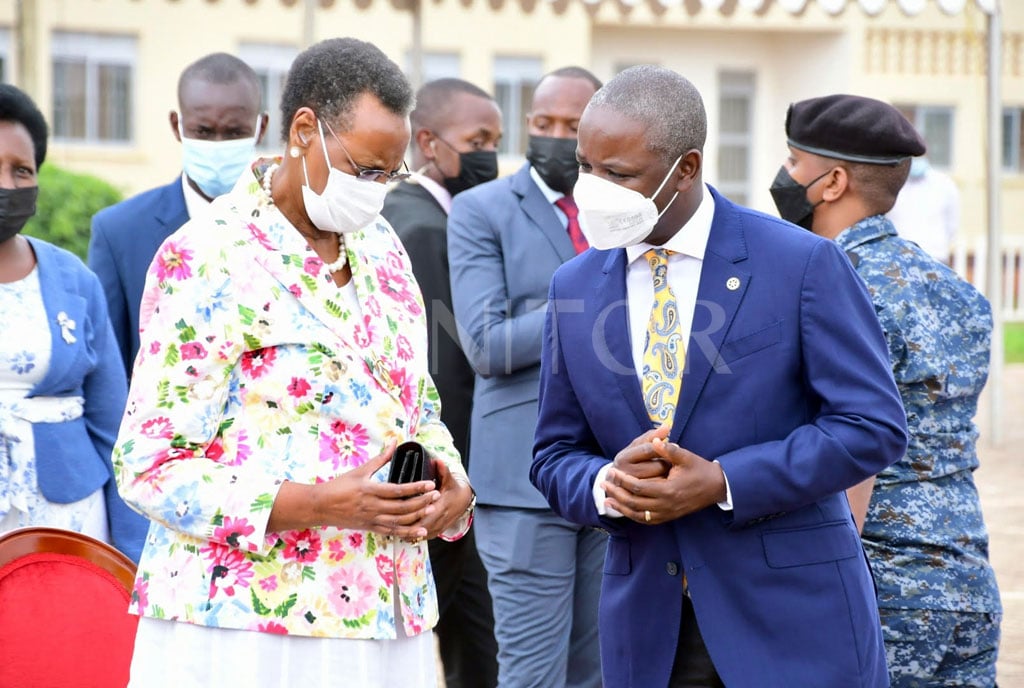Prime
Legislators back call for new anti - gay Bill

The Deputy Speaker of Parlaiment, Mr Thomas Tayebwa. PHOTO/DAVID LUBOWA
What you need to know:
Mr Chris Obore, the director for communication and public affairs at Parliament, said while there are no petitions or ongoing processes to resurrect the contentious law, the legislature is always open to legislate for the needs of the people
Calls for government to intervene and curb the reported gay activities have yet again thrown the legislative arm of government, at the centre, with proposals for stringent laws to be enacted.
Mr Chris Obore, the director for communication and public affairs at Parliament, said while there are no petitions or ongoing processes to resurrect the contentious law, the legislature is always open to legislate for the needs of the people.
The law can either be introduced by the government or a private member. The public can also initiate the process.
“Any citizen is by law free to petition Parliament to come up with legislation. It’s one of the ways Parliament actually works. After receiving any petitions, Parliament subjects them to internal processes in accordance with the rules of procedure of Parliament,” Mr Obore said.
“It is why Parliament is called the voice of the people. A petition is a voice,” he added.
This followed calls by the Inter-religiouseligious Council of Uganda (IRCU), under the leadership of Archbishop Stephen Kaziimba to have the law against homosexuality returned, after it was annulled by the court in 2014.
ALSO READ: Politics, gay debate create chaotic mix
The prelate, who has been vocal against Lesbian, Gay, Bisexual, Transgender, Intersex, Queer and others (LGBTIQ+) activities, said a stringent law against these is long overdue.
A section of legislators we spoke to welcome putting in place more stringent laws.
Ms Sarah Opendi (Tororo Woman MP) said the new law should penalise not just homosexuality, but its promotion, and recruitment, especially among children.
“That is a welcome idea because we do not have a law against the promotion of homosexuality. The Penal code penalises the one who sodomises, goes against the order of nature. But what about those who are promoting this vice among people and children,” she asked.
ALSO READ: Uganda criminalises homosexuality again
Last month, the Speaker of Parliament, Ms Anita Among, ordered a probe into gay activities in schools, where reports cited recruitment of students into the LGBTQ+.
House position
The Deputy Speaker of Parlaiment, Mr Thomas Tayebwa, has on internationally fora declared Parliament’s stand on the matter.
“We are a society that is not ready for homosexuality …In Uganda, issues of LGBT...are issues that can never be accepted and we shall not pass laws that shall allow them,” Mr Tayebwa said while attending the African, Caribbean and Pacific States Parliamentary Assembly, in Zimbabwe last year.
Mr Wilfred Niwagaba, also a shadow attorney general, said a law against homosexuality is welcome. He said the House could amend the Penal Code Cap 120 on unnatural offenses to make it more elaborate, or table a comprehensive new law.
Mr Joel Ssenyonyi, the Bukoto East MP and the spokesperson of the largest Opposition party in Parliament, opined that it is not a matter of enacting a law, arguing there should be political and government will implement it.
“The absence of the law is not the issue. Even the law we have are not being used. The government has not come out to say they lack a law, and so Parliament should enact a new law,” he added.
Mr Ssenyonyi further said: “Even if Parliament passes the law, Mr Museveni will not sign. After the court threw the law out, he asked the MPs behind the law to tone it down because we were annoying many of our friends and partners. Those efforts could have materialised.”
Ms Opendi said these failures in implementation are not in the hands of the House, because they always do their part.
“I want to call upon the President. He is a parent. We cannot be colonised again,” she said.
While legislation against gays gets overwhelming support in the chambers of Parliament, it seems to collapse before it gets to bite.
Background
In 2013, the 9th Parliament under the leadership of then-Speaker Rebecca Kadaga gave Ugandans a “Christmas gift” when they passed the Anti-Homosexuality Act, 2014.
Then Ndwora West MP and now the State minister for Trade, Industry and Cooperatives, Mr David Bahati, had led the acrimonious and animated process that attracted local cheers and international jeers
The global community saw this as an infringement on rights, and some entities retaliated by cutting much needed aid to Uganda. Mr Bahati was in 2013 denied entry to a conference in Washington DC.
President Museveni assented to the law that penalised any person convicted of purports to contract a marriage with another person of the same sex to life imprisonment, but it fell through when it was annulled by the Constitutional Court on grounds that it was passed without quorum.
Parliament again in 2021 overwhelmingly passed clauses against unnatural offences, including same sex relations, as contained in the Sexual Offences Bill, 2021. President Museveni, however, declined to assent to the law on grounds of redundancies and returned it to Parliament for reconsideration. It still remains on the shelves of Parliament.




